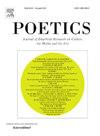The curious transformation of “Critical Race Theory” to “CRT”: The role of election campaigns in American culture wars
IF 2
2区 社会学
0 LITERATURE
引用次数: 0
Abstract
Critical Race Theory has become the latest signifier in the American culture wars, polarizing people across the political spectrum. In this paper, using the Virginia Governor's race as a case study, we ask how a political campaign helped transform Critical Race Theory from an academic theory to an emotionally charged political acronym – “CRT” – thus becoming a symbol evoking, crystalizing, and politicizing moral emotions. We demonstrate how transformative surprises occur in the unfolding performance of public culture: moments when obscure ideas or cultural objects migrate to the center of public discourse and media coverage. Drawing on performance theory, we show how Youngkin successfully “fused” his anti-CRT message with long-standing American cultural ideals to evoke powerful emotional responses. Specifically, Youngkin effectively portrayed his campaign as a grassroots movement of parents protecting children's innocence, the nuclear family, and democracy itself. Simultaneously, Youngkin characterized his opponent, Democrat Terry McAuliffe, as a self-interested career politician and CRT as a divisive, backward political ideology. By tracing these processes, this study provides novel insight into the moral turn in American discourse about race by demonstrating how White racial anxieties manifest in a moral panic about (white) children's endangered innocence. Centrally, we demonstrate the powerful, yet neglected, role of audience emotions in social performances.
从“批判种族理论”到“CRT”的奇特转变:竞选活动在美国文化战争中的作用
批判种族理论已经成为美国文化战争的最新标志,使人们在政治光谱上两极分化。在本文中,我们以维吉尼亚州州长竞选为例,探讨了一场政治运动是如何帮助批判种族理论从一个学术理论转变为一个充满情感的政治缩写词——“CRT”——从而成为一个唤起、具体化和政治化道德情感的象征。我们展示了变革性的惊喜是如何在公共文化的展现中发生的:当模糊的思想或文化对象迁移到公共话语和媒体报道的中心时。根据表演理论,我们展示了扬金如何成功地将他的反crt信息与长期存在的美国文化理想“融合”起来,以唤起强烈的情感反应。具体来说,扬金有效地将他的运动描绘成一场草根运动,父母保护孩子的纯真、核心家庭和民主本身。同时,扬金把他的对手、民主党人特里·麦考利夫(Terry McAuliffe)描述为一个自私自利的职业政治家,把CRT描述为一种分裂的、落后的政治意识形态。通过追踪这些过程,本研究通过展示白人种族焦虑如何表现为对(白人)儿童濒临灭绝的纯真的道德恐慌,为美国关于种族的话语中的道德转向提供了新的见解。我们主要展示了观众情感在社会表演中强大而又被忽视的作用。
本文章由计算机程序翻译,如有差异,请以英文原文为准。
求助全文
约1分钟内获得全文
求助全文
来源期刊

Poetics
Multiple-
CiteScore
4.00
自引率
16.00%
发文量
77
期刊介绍:
Poetics is an interdisciplinary journal of theoretical and empirical research on culture, the media and the arts. Particularly welcome are papers that make an original contribution to the major disciplines - sociology, psychology, media and communication studies, and economics - within which promising lines of research on culture, media and the arts have been developed.
 求助内容:
求助内容: 应助结果提醒方式:
应助结果提醒方式:


